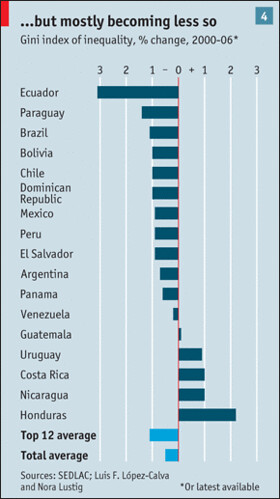By: Inoljt, http://mypolitikal.com/
The Economist, Great Britain’s magazine for the American elite, recently published a special report on Latin America. While the magazine noted the continuing challenges facing Latin America, it also perceived that Latin America has made great strides in the past decade. This has especially been the case with reducing inequality, a perpetual curse of that region in the world – and perhaps the greatest obstacle to economic advancement in Latin America.
In doing this, The Economist published the following table:
More below.
This table indicates the rate by which a country’s inequality – measured by the Gini coefficient – has declined since 2000. The table stops at 2006 or a later date; unfortunately it does not say which countries have data until 2006, and which countries have data after that.
All in all the table paints a bright picture: inequality is down in most countries, from Brazil to Mexico to Argentina.
Several countries, however, stand out as exceptions. The most notable is Venezuela, which has been governed by President Hugo Chavez since 1999. Under Mr. Chavez, inequality has barely decreased. When compared to other countries, Venezuela has done worse than average.
Since so much of Mr. Chavez’s political messaging rests upon his appeal to the poor, this is a startling failure. Mr. Chavez proudly characterizes himself as a socialist, determined to reduce income inequality and redistribute wealth more evenly. Yet after more than a decade of rule, inequality has barely budged – in stark contrast to the rest of Latin America.
One finds that this is the case with a number of Chavez-aligned countries. Anti-American President Daniel Ortega governs Nicaragua, and former anti-American President Manuel Zelaya ruled Honduras until 2009. In both countries the presidents are (or were) left-wing anti-American hardliners committed to socialism and helping the poor. In both countries income inequality has actually increased.
There are exceptions. President Evo Morales is as left-wing and anti-American as any Latin American leader, and Bolivian inequality has decreased substantially. Moreover, some of these leaders were not in power before 2006, so they may not be responsible for what the graph shows (although in some cases the data may be more recent). Their elections may have been a response to rising inequality – rather than to say that they failed at reducing inequality.
But Mr. Chavez has been in power since before 2000. He has no such excuse. When a president comes into office promising to help the poor, a good way to measure whether he or she has kept the promise is to look at how the poor have done relative to the rich. By that measure, Mr. Chavez – for all his about rhetoric about socialistic revolution – has not helped Venezuela’s poor.

3 comments